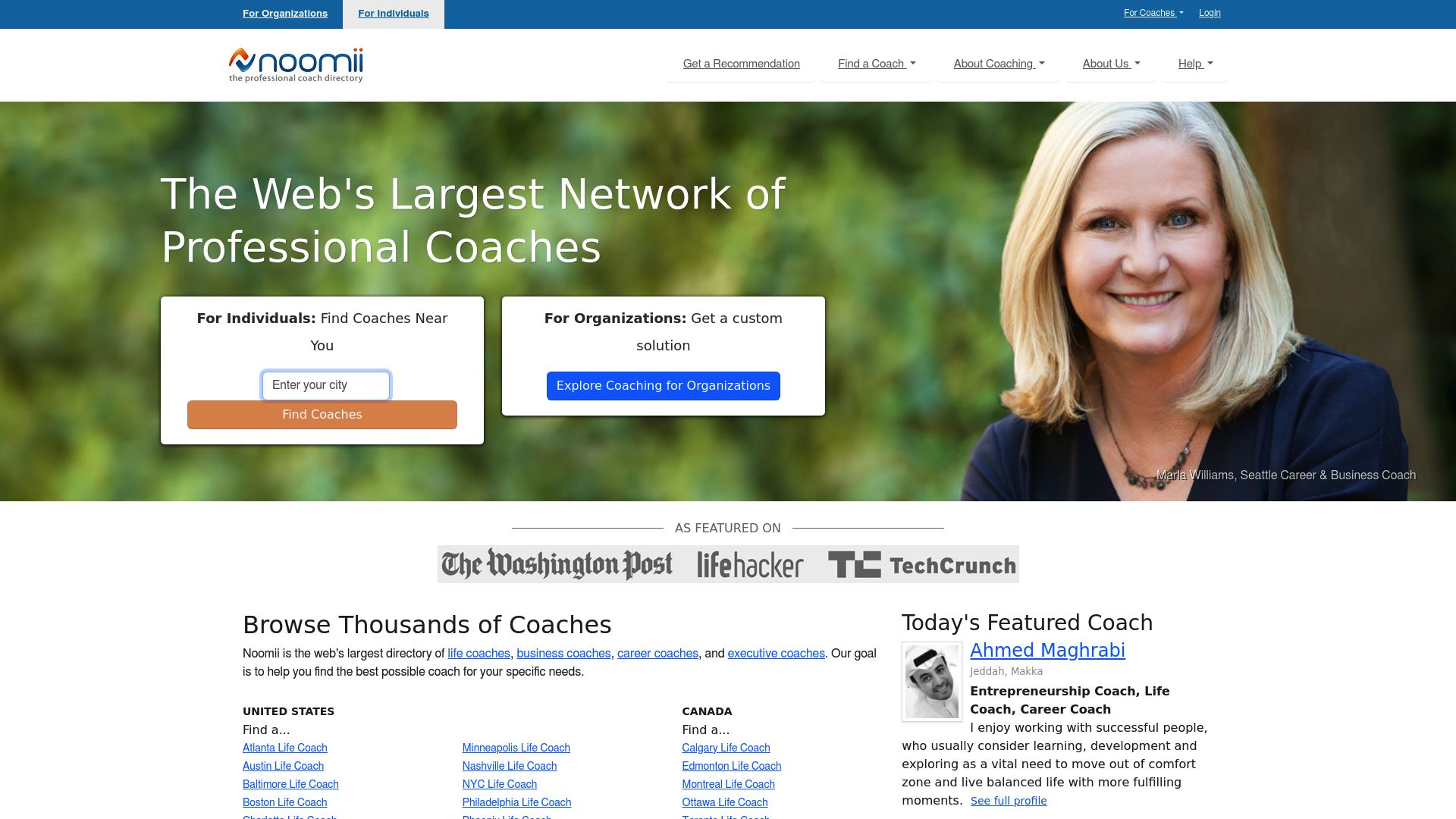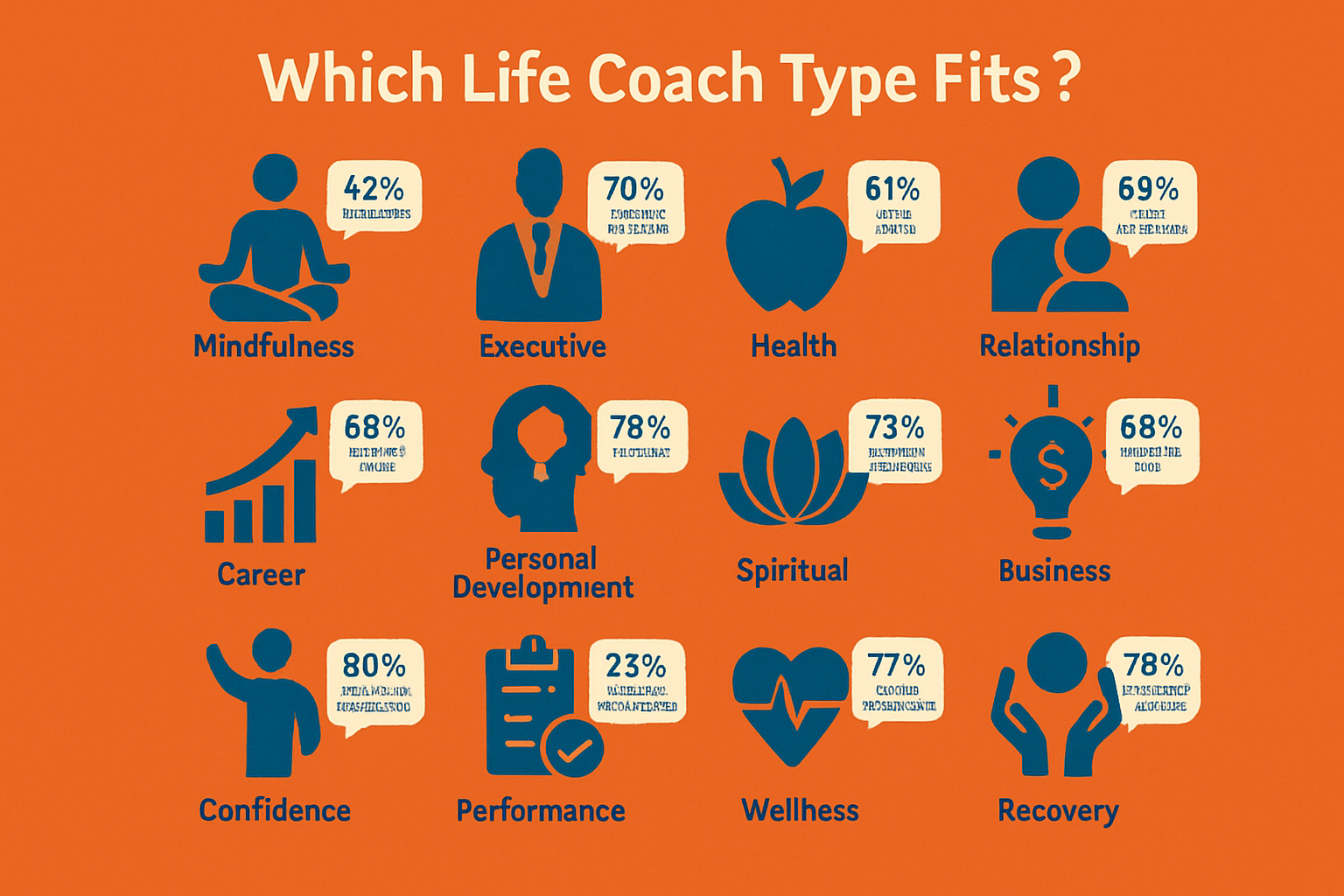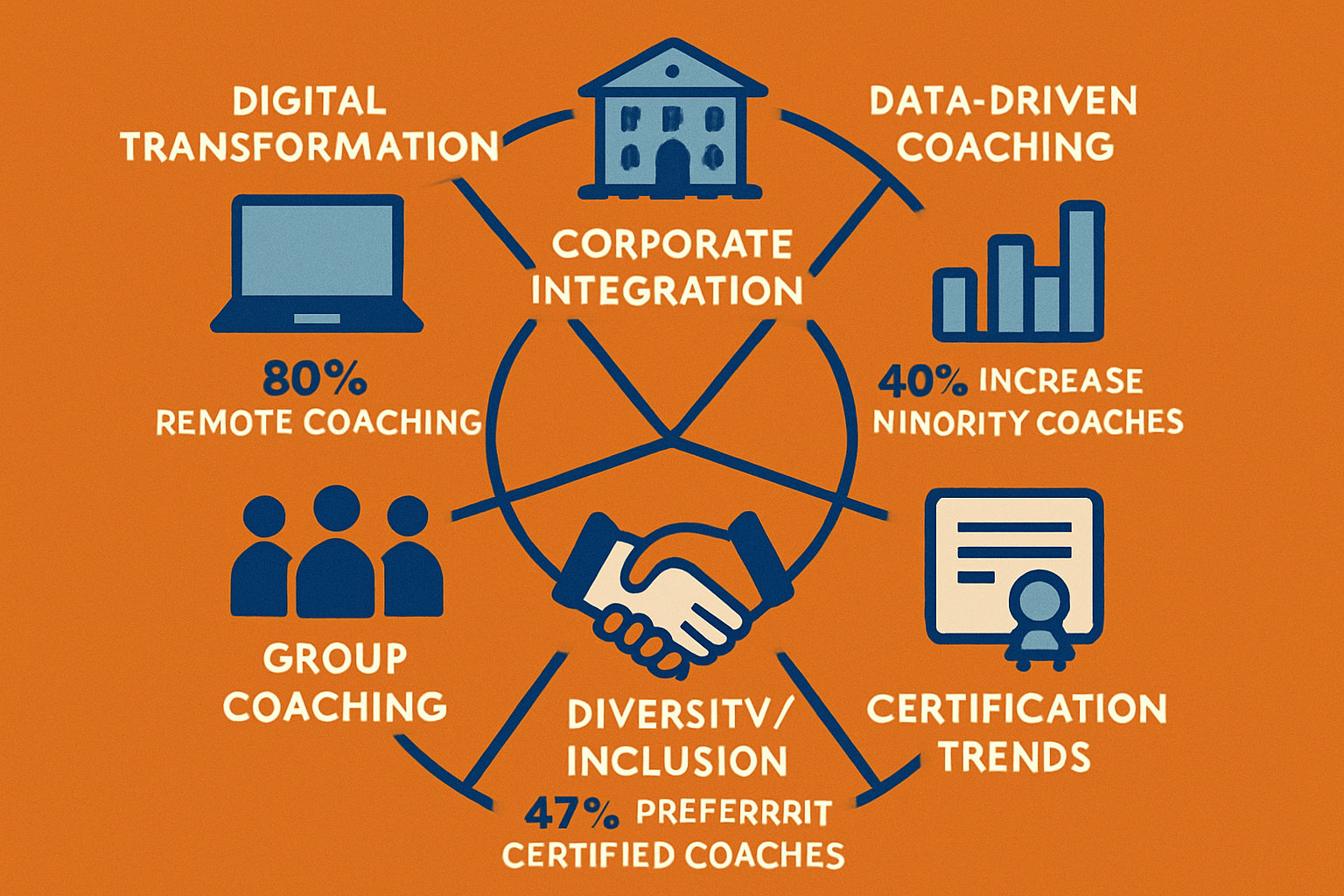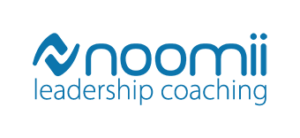12 Different Type of Life Coaches to Know in 2025
The world of life coaching is shifting faster than ever. With rising demand and new challenges, knowing the different type of life coaches available can truly transform your personal or professional journey.
In 2025, being informed about all twelve coaching specialties will be critical for anyone ready to grow. Each coach type addresses unique goals, from career changes to wellness breakthroughs.
Curious which coach could help you thrive? Use this guide to understand the options and confidently choose the best coaching partner for your next step.
The Growing Importance of Life Coaching in 2025
The landscape of life coaching is transforming as we head into 2025. More people than ever are turning to a different type of life coaches to help them navigate change and achieve their goals. The industry’s rapid growth signals both rising demand and a broader acceptance of coaching as a valuable tool for personal and professional success.
The Expanding Life Coaching Industry
The life coaching industry is projected to surpass $4 billion by 2025, with a significant boost in the number of practicing coaches worldwide. Increased awareness of mental health and personal development is fueling this surge, as is the growing desire for support tailored to individual needs.
Technology plays a major role, making it easier for people anywhere to access a different type of life coaches. Remote coaching options, apps, and virtual platforms are breaking down barriers and fostering global connections. Companies are also investing more in coaching, offering wellness stipends and programs that support employee well-being.
According to the International Coach Federation, the number of coaching professionals has risen by 33% since 2020. This expansion is matched by new specialties, ensuring that clients can find exactly the right support for their unique challenges.
Why Specialization Matters in Life Coaching
As the industry expands, clients are seeking a different type of life coaches who specialize in their specific areas of need. Specialized coaches are able to deliver targeted strategies and help clients achieve results more quickly.
For example, executive coaches focus on leadership and business outcomes, while relationship coaches offer skills for communication and connection. This distinction is important, as it builds trust and credibility within the industry. Specialization also allows coaches to charge premium rates and drives higher satisfaction among clients.
A recent survey by the ICF found that 60% of clients prefer working with niche coaches. By choosing a specialized coach, clients benefit from a personalized approach that addresses their unique goals and challenges, making specialization a true differentiator in today’s coaching landscape.
How to Choose the Right Type of Life Coach
Choosing among the different type of life coaches starts with a clear understanding of your personal or professional objectives. Consider what you hope to achieve—whether it’s career advancement, improved health, or deeper relationships.
Look for coaches with strong credentials, proven experience, and a methodology that resonates with you. Chemistry is crucial; a good coach-client fit can make all the difference. Review testimonials and success stories to gauge the coach’s impact.
Use directories and matching services to narrow your options. Many platforms offer intake questionnaires to help you connect with a coach who aligns with your values and goals. Be mindful of red flags, such as vague promises or lack of certification. Ultimately, the best coach will empower you to grow in the way that’s most meaningful to you.
Find the Right Life Coach for You
Finding a different type of life coaches is easier than ever thanks to platforms like Noomii. Noomii offers the world’s largest directory of certified life coaches, making it simple to search by specialty, location, or coaching style.

Their SmartMatch™ service pairs clients with coaches who suit their unique needs and budget. Free resources guide you through the process, explaining the differences between coaching types and what to expect. For coaches, Noomii provides business tools and lead generation.
With over 15 years of experience, Noomii is trusted by individuals and organizations alike. Many clients have shared success stories after finding their ideal coaching partner through the platform. In 2025, Noomii’s comprehensive approach helps you confidently choose the right coach for your journey.
12 Different Types of Life Coaches to Know in 2025
As the demand for coaching grows, understanding the different type of life coaches is essential. In 2025, people are seeking coaches who fit their unique needs and aspirations. Let’s explore the 12 specialties shaping the coaching landscape this year, helping you find the perfect guide for your journey.

1. Mindfulness Coach
A mindfulness coach specializes in teaching clients how to be present and manage stress through mindful living. They use techniques like guided meditation, breathwork, and cognitive reframing to help clients reduce anxiety and improve focus. This different type of life coaches is ideal for busy professionals, high-stress individuals, or anyone seeking calm in a fast-paced world.
- Focus: Present-moment awareness, stress management.
- Techniques: Meditation, breathwork, reframing thoughts.
- Benefits: Lower anxiety, improved concentration, emotional regulation.
- Ideal for: Professionals, caregivers, those with anxiety.
- Example: Tech companies using mindfulness coaching for productivity.
- Data: 70% of clients report reduced stress.
- Distinction: Not therapy—focuses on present awareness.
- Insight: As digital distractions rise, so does demand for mindfulness.
Mindfulness coaches stand out among the different type of life coaches by helping clients build resilience and clarity through daily practice.
2. Executive Coach
Executive coaches focus on leadership development for managers, CEOs, and emerging leaders. They use methods like 360-degree feedback, communication training, and goal setting to optimize performance and decision-making. This different type of life coaches is essential in today’s complex workplace.
- Focus: Leadership, performance, strategic thinking.
- Methods: Feedback, communication, goal planning.
- Benefits: Enhanced leadership, better decision-making, team management.
- Ideal for: Executives, managers, high-potential employees.
- Example: Executive coaching linked to 25% higher team productivity.
- Data: 86% of companies report positive ROI.
- Distinction: Targets business outcomes.
- Perspective: Crucial for navigating modern workplace challenges.
To explore more about this specialty, visit Business and executive coaching for a directory of experts.
3. Life Purpose Coach
Life purpose coaches help clients uncover their mission and direction in life. Using values assessments, vision mapping, and goal alignment, this different type of life coaches guides people toward greater fulfillment and clarity.
- Focus: Self-discovery, meaning, direction.
- Techniques: Values assessment, vision boards, alignment exercises.
- Benefits: Clarity, motivation, fulfillment.
- Ideal for: Career changers, those seeking meaning.
- Example: Supporting clients through career transitions.
- Data: 62% report increased life satisfaction.
- Distinction: Goes beyond surface goals to deep self-exploration.
- Insight: Popular among millennials and Gen Z.
Life purpose coaches play a vital role among the different type of life coaches for those at a crossroads.
4. Health and Wellness Coach
Health and wellness coaches guide clients toward healthier lifestyles and holistic well-being. Using nutrition planning, exercise routines, and habit formation, this different type of life coaches supports physical, mental, and emotional health.
- Focus: Lifestyle change, well-being, prevention.
- Methods: Nutrition, exercise, habits.
- Benefits: Improved health, energy, disease prevention.
- Ideal for: Those with health goals or chronic issues.
- Example: Corporate wellness coaching programs.
- Data: 50% reduction in absenteeism with coaching.
- Distinction: Integrates all aspects of health.
- Perspective: More vital than ever in a post-pandemic world.
With the health coaching industry projected to reach $30 billion, this specialty is thriving.
5. Relationship Coach
Relationship coaches help clients build healthy, fulfilling connections. They teach communication skills, conflict resolution, and emotional intelligence, making this different type of life coaches invaluable for couples, singles, or anyone aiming to improve their relationships.
- Focus: Communication, intimacy, connection.
- Methods: Conflict resolution, emotional intelligence.
- Benefits: Stronger bonds, improved satisfaction, less conflict.
- Ideal for: Couples, singles, families.
- Example: Supporting remote couples during lockdowns.
- Data: 73% report improved relationships.
- Distinction: Works with individuals or couples.
- Insight: Demand surges as social dynamics evolve.
Relationship coaches offer a unique approach within the different type of life coaches, focusing on connection and understanding.
6. Career Coach
Career coaches assist with transitions, advancement, and job satisfaction. Through resume building, interview prep, and career mapping, this different type of life coaches helps clients achieve professional goals.
- Focus: Career growth, transitions, satisfaction.
- Methods: Resume, interview, path mapping.
- Benefits: Confidence, higher salaries, fulfillment.
- Ideal for: Job seekers, professionals, changers.
- Example: Doubling job placement rates through coaching.
- Data: 80% of clients secure desired roles.
- Distinction: Tailored to professional development.
- Perspective: Essential as the job market shifts in 2025.
For those seeking professional transformation, career coaches are a critical part of the different type of life coaches.
7. Empowerment Coach
Empowerment coaches focus on building confidence, self-esteem, and assertiveness. Using positive psychology and belief reframing, this different type of life coaches helps clients overcome self-doubt and embrace their strengths.
- Focus: Confidence, self-worth, motivation.
- Techniques: Positive psychology, reframing, empowerment exercises.
- Benefits: Resilience, motivation, greater self-worth.
- Ideal for: Those facing change or self-doubt.
- Example: Women re-entering the workforce.
- Data: 68% report higher self-confidence.
- Distinction: Tackles internal barriers.
- Insight: Popular for those seeking breakthroughs.
Empowerment coaches are among the most transformative different type of life coaches, especially for personal breakthroughs.
8. Transformational Coach
Transformational coaches facilitate deep, lasting life changes. They use evocative questioning, mindset shifts, and sometimes spiritual principles to address root causes, making this different type of life coaches ideal for those seeking profound growth.
- Focus: Lasting change, growth, clarity.
- Methods: Mindset shifts, deep questioning, spirituality.
- Benefits: Personal growth, clarity, fulfillment.
- Ideal for: Those seeking major life change.
- Example: Clients making life overhauls after coaching.
- Data: 75% sustain changes a year after coaching.
- Distinction: Goes to the root, not just symptoms.
- Perspective: Sought after for holistic change.
Transformational coaches are a cornerstone among the different type of life coaches for lasting impact.
9. Accountability Coach
Accountability coaches keep clients on track with goals and commitments. Through regular check-ins and progress tracking, this different type of life coaches helps ensure follow-through and consistency.
- Focus: Support, consistency, goal attainment.
- Methods: Check-ins, tracking, action plans.
- Benefits: Higher success rates, motivation, follow-through.
- Ideal for: Entrepreneurs, students, remote workers.
- Example: Boosting project completion rates.
- Data: 95% success rate with accountability built in.
- Distinction: Emphasizes support and follow-up.
- Insight: Critical for solo entrepreneurs.
Accountability coaches fill a crucial role within the different type of life coaches, providing structure and encouragement.
10. Self-Discovery Coach
Self-discovery coaches guide clients to understand their true selves and unlock potential. Using personality assessments and self-reflection exercises, this different type of life coaches helps those feeling lost find clarity.
- Focus: Self-awareness, authenticity, potential.
- Techniques: Assessments, journaling, reflection.
- Benefits: Clarity, better decision-making, authenticity.
- Ideal for: Recent graduates, those at crossroads.
- Example: Coaching for graduates entering the workforce.
- Data: 60% report improved clarity.
- Distinction: Exploration-driven, not just solution-driven.
- Perspective: Growing in popularity among younger clients.
Self-discovery coaches are a vital part of the different type of life coaches for those seeking direction.
11. Abundance Coach
Abundance coaches help clients cultivate prosperity in all areas of life. Using manifestation and mindset reprogramming, this different type of life coaches addresses limiting beliefs and opens doors to opportunity.
- Focus: Prosperity, gratitude, opportunity.
- Methods: Manifestation, mindset shifts, abundance exercises.
- Benefits: Increased prosperity, gratitude, success.
- Ideal for: Entrepreneurs, anyone wanting more from life.
- Example: Entrepreneurs scaling businesses after coaching.
- Data: 70% report improved outcomes.
- Distinction: Broader than financial coaching.
- Insight: Holistic prosperity is increasingly in demand.
For a deeper dive into specialties, review 13 types of life coaches for additional perspectives.
12. Spiritual Life Coach
Spiritual life coaches support clients’ spiritual growth and connection. Through meditation and values alignment, this different type of life coaches helps clients find inner peace and purpose.
- Focus: Spiritual growth, purpose, resilience.
- Methods: Meditation, spiritual principles, alignment.
- Benefits: Inner peace, purpose, resilience.
- Ideal for: Those on spiritual journeys or facing transitions.
- Example: Coaching for clients coping with loss.
- Data: 55% report greater life satisfaction.
- Distinction: Not tied to any one religion.
- Perspective: Demand is rising for holistic well-being.
Spiritual life coaches round out the different type of life coaches, offering support for those seeking deeper meaning.
Trends and Predictions for Life Coaching in 2025
The world of life coaching is on the cusp of extraordinary transformation. As we move into 2025, several major trends are shaping how the different type of life coaches deliver value, connect with clients, and set new benchmarks for growth. Let’s dive into the most influential predictions set to define the future of this dynamic industry.

Digital Transformation and Remote Coaching
Technology is revolutionizing the different type of life coaches available today. The shift to virtual coaching, video calls, and AI-powered platforms means clients can now access support worldwide, no matter their location. For example, coaching apps are making it possible to get on-demand guidance and tailored advice anytime.
According to the International Coaching Federation, 80% of coaching sessions are now delivered remotely. This evolution brings greater flexibility, convenience, and often lower costs for both coaches and clients. It also introduces new challenges, like maintaining authentic personal connections in digital spaces.
Hybrid models—blending online and in-person sessions—are emerging as a preferred approach. AI chatbots and digital platforms are now part of the coaching toolbox, as explored in AI chatbots in workplace coaching, helping coaches deliver more responsive and scalable support.
Integration of Coaching in Corporate Settings
The integration of the different type of life coaches into corporate environments is accelerating. Companies are investing in coaching to boost productivity, employee engagement, and retention. Coaching is now a standard feature in many leadership development programs.
Fortune 500 companies are embracing both executive and wellness coaching as essential tools for talent management. In fact, 60% of organizations plan to increase their coaching budgets in the coming year.
Benefits include higher employee satisfaction, reduced turnover, and a more resilient workforce. As coaching becomes a competitive advantage, organizations are also seeking ways to measure outcomes and demonstrate tangible ROI.
Data-Driven and Evidence-Based Coaching
A growing focus on data is reshaping the different type of life coaches and how they operate. Coaches are leveraging digital assessments, metrics, and regular feedback to track client progress and personalize coaching plans.
For example, some platforms use AI to analyze growth and suggest next steps. Today, 90% of coaches use digital tools to enhance accountability and transparency in their practice.
Clients increasingly expect measurable results, favoring evidence-based approaches that balance analytics with human intuition. This trend is strengthening the credibility and professionalism of the coaching industry as a whole.
Increasing Diversity and Inclusion in Coaching
Diversity is becoming a defining strength among the different type of life coaches. More clients are seeking culturally competent coaches who understand their unique backgrounds and challenges.
The number of minority coaches has risen by 40% since 2020, expanding access and representation for underrepresented groups. Coaching programs tailored to specific communities are gaining traction, offering broader perspectives and better client-coach fit.
Challenges remain, such as addressing unconscious bias and removing barriers to access. However, this focus on inclusion is driving important innovation and making coaching more relevant for a global audience.
The Rise of Group and Community Coaching Models
Group and community coaching models are democratizing access to the different type of life coaches. Group coaching offers cost-effective solutions, while mastermind groups and cohort-based programs create supportive networks for shared learning.
About 35% of clients now participate in group coaching experiences. These models deliver accountability, networking opportunities, and valuable peer insights.
While group formats can limit individual attention, they foster a sense of community and collective growth. This trend is expected to expand, making coaching more accessible to diverse populations.
Evolving Certification and Regulation Standards
The standards for the different type of life coaches are rising. There is increased emphasis on formal accreditation, ethics, and ongoing education. Organizations like the ICF and EMCC are introducing stricter quality assurance measures.
For clients, credentials matter: 75% prefer working with certified coaches. Coaches are now required to engage in continuing education to maintain their certifications, helping to ensure professionalism and trust.
If you’re seeking a certified coach, platforms like Find a certified life coach can help you connect with professionals who meet these evolving standards. As regulation becomes more consistent, clients can feel confident about the quality and safety of their coaching experience.
If you’re a professional coach inspired by the growing demand and diversity in the coaching world for 2025, this is your moment to shine. People are searching for specialized support more than ever, and having a strong online presence helps you connect with those ready for real change. At Noomii, we make it easy for you to reach clients who are looking for your unique expertise—whether you coach in mindfulness, executive leadership, relationships, or beyond. \
Ready to be discovered by clients who need exactly what you offer? Get Your Free Listing and take the next step in growing your coaching practice today.

Trackbacks & Pingbacks
[…] confidence building or executive growth. To understand the range of expertise available, check out different types of life coaches and compare their […]
[…] understand distinctions among coaching types, see this overview of different types of life coaches, which clarifies how life direction coaching for midlife professionals in hamburg stands apart. […]
[…] you’re unsure which coaching style fits your needs, explore the different types of life coaches available in Berlin to find the best match for your […]
[…] the different types of life coaches to better match your needs with the right […]
[…] goals, and hold them accountable for progress. Coaching specialties can vary, so understanding the types of life coaches explained is crucial for finding the right fit. The core principles include holistic well-being, […]
[…] values, and communication style. If you are unsure which specialty fits your needs, explore the different types of life coaches available. This resource can help you decide whether you need support with career growth, health, […]
[…] coaching community also recognizes the importance of specialization. Clients can use resources like Different types of life coaches to identify coaches who match their unique goals, whether in leadership, confidence, or career […]
Leave a Reply
Want to join the discussion?Feel free to contribute!